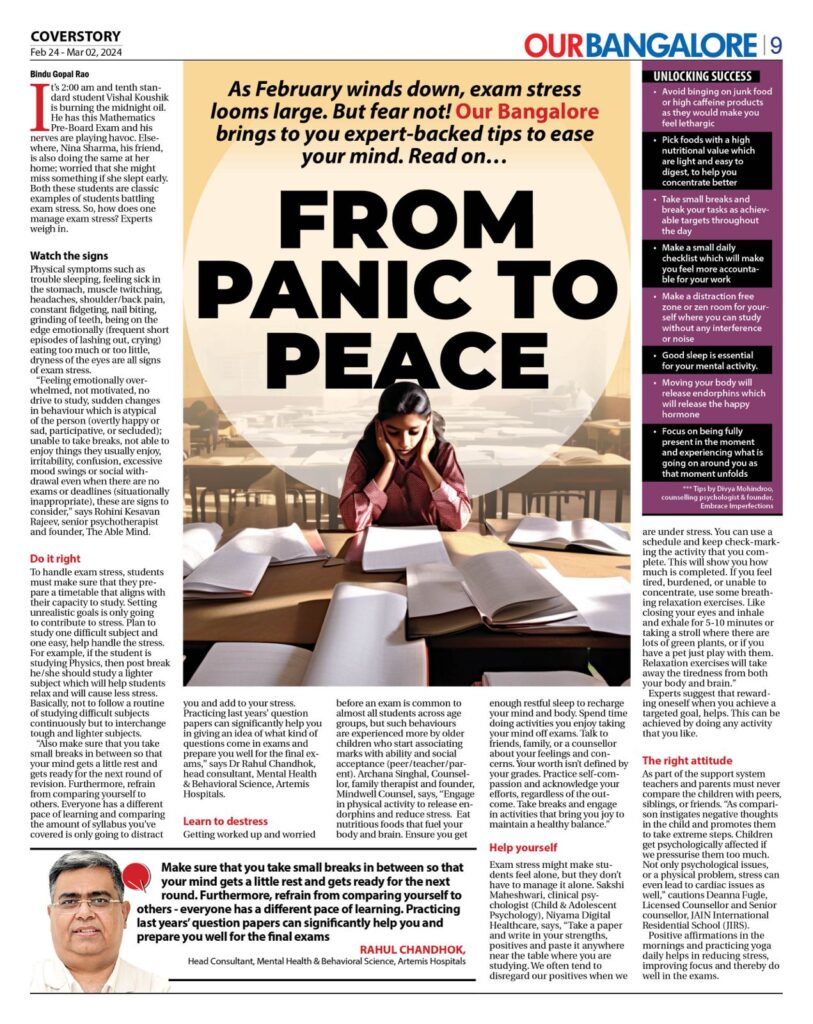
This is how you can manage exam stress
- Breathe right and purposefully to relax. Diaphragmatic breathing, a mind-body practice, is known to improve sustained attention, affect/cognition which means lesser anxiety and negative thoughts, and lower cortisol levels, which in turn means reduced stress.
- To practice diaphragmatic breathing, choose a quiet, comfortable spot to sit or lie down. Then, place one hand on your chest and the other on your abdomen. Make sure your belly rises as you take a slow, deep breath. This indicates that your diaphragm, not your chest, is being used for breathing. Breathe out slowly, letting your stomach descend again. Repeat multiple times, paying attention to your breathing and letting go of any physical tension.
- Positive affirmation. Remind yourself that final exams are the ones you are most prepared for. You have worked hard the whole year through, you have revised, discussed with friends and teachers, written several practice tests and done your best in the previous exams, you know the answers, now let your mind and memory work in your favour. Take time to remind yourself that you have got this covered. Attitude is most important.
- Previous night prep. Keep the uniform ready and make sure you pack your bag with all the necessary stationary, ID and admit card, water bottle etc. to avoid last minute panic. Check twice when in doubt but no more. If worried, write a small list of what needs to be carried and tick the items off it.
- Avoid last minute cramming. It can leave you feeling overwhelmed, what you learnt in a year cannot be revised in 3 minutes. However, if you need that boost of last minute reading, you might want to consider making quick notes for objective questions much in advance and refer to those points alone.
- Reach the exam hall just in time and before that spend some moments quietly, close to the hall, alone; try and avoid other anxious exam goers and listen in on last minute notes exchange as it may increase your exam anxiety and make you doubt your preparedness.
- Respect your mind and body: Get adequate rest (active rest that involves a technique called progressive muscle relaxation, calming down listening to your favourite music and passive rest like sleep, both are important); eat right (a light and refreshing meal) to keep hunger and exhaustion at bay.
- Don’t focus on the stress and anxiety, it will feed into it more. If you find your mind racing with negative thoughts, silently think -“STOP”. Focus on a single point in the room, a picture or a window or the rotation of a fan, simply concentrate on that for a few seconds and then re-focus on the paper.
Here are ways to reduce exam-stress anxiety beforehand.
- Take a test (easily available online) to understand your learning and thinking style. This self-governing technique can be helpful in figuring out the most effective way for you to learn and retain information. It can enhance personal learning strategies.
- Prepare. There is no alternative to preparation when it comes to acing an exam. Get an overview of your syllabus, discuss the pain points with your parents and teachers. Seek extra help in those areas that you see as potentially challenging.
- Pomodoro Technique of Time bound studying. Extended periods of intensive studying can lead to massive fatigue. To avoid this and make the most of your attention span, try applying the Pomodoro technique which incorporates short, frequent breaks into long periods of studying. It provides a structure resulting in the vast amount of portions not overwhelming you as much.
- Exercise your body and your mind. Make sure to play an outdoor sport, go for a run or brisk walk/gymming at least 45 minutes a day for three days a week without fail. Talk to your mentor/a mental health professional proactively in short intervals to discuss the everyday grind, not let fears, expectations and inadequacies fester and learn healthy ways to cope with anxiety and stress. What’s more, this will help you find your own personal cheerleader!
- Put things in perspective. Education is for knowledge and skill building, it is not a means to compare. Exams are necessary to assess how much we know and the areas which require a little more of our attention, however marks don’t decide your self-worth! Focus on learning and growing. Use the opportunity to improve and not criticise yourself or judge. Life will give us several opportunities to become what we dream of becoming, don’t let your exam results come in the way of your self-belief. Application of knowledge is far more important than topping the class. However, if topping is important to you, then be consistent in your preparation, respect your body and mind and don’t overstrain, seek help when in distress and be strategic.
Tips
- Do prioritize self-care and take breaks when needed.
- Do ask for help if you’re struggling with understanding the material.
- Do practice relaxation techniques to manage stress.
- Do maintain a balanced lifestyle with proper nutrition and sleep.
- Do stay organized and manage your time effectively.
- Don’t wait until the last minute to start studying.
- Don’t compare yourself to others.
- Don’t neglect your physical and mental health.
- Don’t use unhealthy coping mechanisms like substance abuse.
- Don’t be too hard on yourself for mistakes or setbacks.
Read the full story that first appeared in Our Bangalore dated Feb 24-Mar 1, 2024 here:
A downloadable PDF is here:

Leave a Reply